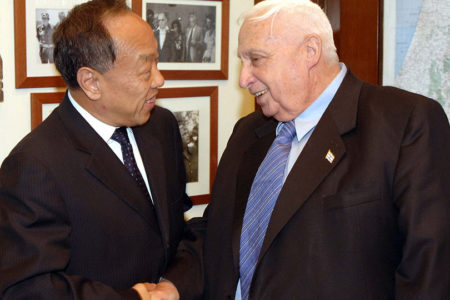Dancing with the Devil
The wrong question is being asked these days. And it is time the world started asking the right one.
Since February, Hamas has been in control of the Palestinian Authority (PA). True to form, the organization so accustomed to pushing the detonator on explosives laced with nails and shrapnel has maintained the same predictable, terrible tenor: Negotiations with Israel are nowhere on the agenda, and Hamas has no intentions of disarming or changing its charter position on the desirability of Israel’s destruction.
In the Hamas Charter of 1988, the Preamble declares, “Israel will exist until Islam obliterates it, as it obliterated others before it.” Article 6 demands control of “every inch of Palestine.” Article 13 states, “Jihad is the only solution for the Palestinian question.” And Article 14 pronounces, “Liberating Palestine is an individual duty for every Muslim.”1
Several theories for Hamas’s victory in the January 2006 parliamentary elections have included these: PA voters wanted Hamas as a negotiating partner against Israel because it could strike a tougher stance; some simply wanted to send a message to the Fatah party that average folks were sick and tired of the old Arafat-style corruption. Whatever the reason, “democratic” elections took place.
Since then, news commentators and networks (including BBC News) have wrung their hands, asking, “Will Hamas ever recognize Israel?”
However, the wrong question is being asked. Instead of “Will Hamas ever recognize Israel?” the real question is this: “Must Israel ever recognize Hamas?”
Putting a finer point on it, Does Israel have any obligation, rooted in concepts of either justice or morality, to negotiate with the Hamas “government” now installed within the PA?
I think not. And what follows are one man’s reasons for saying so.
Knowing the Players
It isn’t sufficient merely to refer to Hamas as a terrorist organization. That doesn’t go far enough. Granted, the United States, European Union, Canada, Australia, and Israel all list it as a terrorist group. It also is supposedly banned in Jordan.
Yet some terrorist entities, like the Irish Republican Army (IRA) in Ireland, seem capable (eventually) of a kind of transformation—a gradual migration to a modicum of recognition for social compacts and compromise, to some understanding of human decency, and to at least a passing interest in the rule of law.
Not so Hamas. Its name (meaning “fire, fanaticism”) denotes its operational philosophy. Since 1988 it has launched shootings, knifings, and kidnappings, but its real designer-death trademark is the “martyrdom operation” using suicide bombers. The deadliest of these was the grotesque Passover bombing at a Netanya hotel on March 27, 2002, where 30 people were killed and 140 injured.
The group had also called for the assassination of former Israeli Prime Minister Ariel Sharon. Compromise and conciliation are part of a lexicon that is completely foreign to Hamas.
On the other hand, it has been argued that, as Hamas adjusts to the realities and responsibilities of political power, it will get practical—i.e., it will come to the negotiating table with Israel. Boston Globe reporter Anne Barnard, for example, wrote: “These voters say they believe Hamas will turn more pragmatic as it moves from violent outsider to governing party.” 2
However, there is a problem with such thinking. Hamas has really not been on the outside of PA politics. It has, in point of fact, been intrinsically interwoven into the woof and warp of PA policies.
On August 7, 2001, Hamas, the Palestinian Authority, and Islamic Jihad reached a formal agreement concerning “a government of national unity”; two days later, a Hamas-orchestrated suicide bomber, equipped with explosives packed with nails to increase casualties, blew himself up at the Sbarro’s restaurant in the family-friendly western section of Jerusalem. Most of the 18 people killed were women and children; and the Passover slaughter the following March was green-lighted by Yasser Arafat, who sat in on meetings in which the operation was planned.3
In 2004 a U.S. District Court held that Hamas should be liable for the murders of Yaron and Efrat Unger near Beit Shemesh, Israel. It also determined that the Palestinian Authority had given safe haven to the Hamas assassins.
Setting a Framework
Those who clamor for Israel to engage with a Hamas-run PA do so, presumably, because they believe there is an extrinsic, objective standard that should compel one nation to negotiate with another in an effort to wage peace rather than war.
Sometimes the term social justice is used to indicate the source of that kind of obligation. But more often than not, it is used by theological liberals to connote an agenda that has troublesome implications.
I prefer the term principles of justice. Now, do such principles require Israel to negotiate with Hamas?
Most of us recognize, at least in theory, the wisdom in the policy followed by the United States, Israel, and other nations involved in the war on terror; it counsels against negotiating with terrorists. The reasons are obvious. But what are we to make of the fact that terroristic Hamas was freely elected to power?
Elections are not the only criteria for determining a legitimate government. Adolf Hitler was freely elected on a socialist party platform. There were signs, of course, that he would prove to be more demonic than democratic. And Saddam Hussein held elections of a sort.
To constitute a legitimate democracy, government institutions that respect the rule of law are needed, in addition to elections. That one fact alone distinguishes Israel from almost all Arab nations.
Admittedly, Iraq is struggling to become an exception. In addition to free elections, it has shown the world how it has created government branches that operate legitimately (even if somewhat weakly). Its special war-crimes tribunal is a good example. It affords legal defense counsel to Hussein and his cohorts and follows procedural rules. Can anyone imagine, by contrast, a Palestinian tribunal actually holding Yasser Arafat (if he were alive) responsible for his vast crimes against humanity?
The PA has done nothing to police its own corruption and nothing to slow its reign of terror against Israeli citizens. Hamas promises not only to continue that kind of thuggery as politics, but also to expand it exponentially.
Therefore, by what justice standard can we impose any duty on Israel to negotiate?
If we look to international law principles as an example, those paradigms seem to relieve Israel of that obligation.
Rules like the Act-of-State Doctrine seek to engender respect for nation states, even if the nations are only quasi -legitimate or even outright undemocratic, as long as they function as authentic, identifiable forms of government.
No matter what we may say about the evils of Communism, Cuba is a form of nation state. Thus, when Cuba confiscated American sugar interests on that island in the 1960s, the U.S. Supreme Court ruled in Banco Nacional de Cuba v. Sabbatino that the Act-of-State rule applied: Cuba was entitled to the presumption that its formal actions were lawful, even if they seemed to violate international law norms.
Yet the Palestinian Authority, even before the Hamas landslide electoral victory, lacked nation-state status. The PA is not a nation. It seeks (but does not yet have) borders, a standing army, a clear chain of governmental authority, and a uniform court system.
Now that blood-soaked Hamas is in control, whatever justice obligation Israel had to deal with the PA as a bargaining partner has evaporated.
Bringing It Home
How should Israel respond to Hamas? In his 2006 State of the Union address, President George W. Bush called on Hamas, as a prerequisite to legitimacy, to renounce terrorism and acknowledge Israel’s right to exist. Yet the Bush administration had refused to negotiate with Arafat in years past. Is Hamas any more legitimate than Arafat simply because it won an election?
Even if we acknowledge that the Hamas-led PA should be negotiated with, I would suggest the approach Bush used with Saddam Hussein. The Iraqi dictator was given ultimatums and deadlines for compliance. So should Hamas. It has not earned the right to be treated in any other way.
Only if (and that is a monstrously large if) Hamas changes substantially—structurally, ideologically, and strategically (in other words, if Hamas ceases to be Hamas)—can it ever gain the position of a negotiating partner with Israel.
The bottom line, then, is this: Israel has absolutely no obligation to negotiate with the Hamas-controlled Palestinian Authority; however, it is free to negotiate if (and only if) there is some direct, tangible, national benefit in doing so. At present, it is difficult to envision any benefit accruing to Israel from that kind of endeavor. The burden of proof is on Hamas, not on Israel.
Following the PA elections, Ehud Olmert, then acting Israeli prime minister, vowed to deal with the PA as long as “the Palestinian government isn’t led by Hamas.”4 Today that stance puts Prime Minister Olmert in a difficult position. Under pressure from Washington, he quickly released some $54 million in tax and custom revenues to the PA. Likud party leaders in Israel called the payment a gift to Hamas. It is difficult to criticize the logic of that statement.
Lest we think that Israel’s problem with Hamas is Israel’s alone, two examples should suffice to explode that myth. Hamas is also America’s problem.
In 2001, leading up to the eventual Iraqi invasion, Iraq had been lobbing missiles at U.S. military reconnaissance aircraft. Tensions were growing. But Iraq was not merely engaged in “defensive” attacks on American aircraft. Saddam Hussein and his cronies were also sending Iraqi troops into Jordan (some 1,500 of them); from there, Iraq delivered weapons and ammunition to Hamas cells in Jordan and in the Palestinian Authority to use against Israel—proof positive of the interconnectedness of the web of terrorism in the Middle East.5
Then there was the visit of Colin Powell, then U.S. secretary of state, to Israel in April 2002. His entourage was scheduled to drive along Highway 1. Palestinian terrorists, posing as Red Crescent medics driving an ambulance, were planning to pull over to the side of the road where they were to detonate a large bomb located in the ambulance as Powell’s motorcade approached. The plot was foiled only because of the diligence of Israel’s security forces, which had been following the suspicious ambulance. The plan had the approval and supervision of the Palestinian leadership.6
In the final analysis, it is impossible to separate Israel’s dilemma with Hamas from America’s dilemma with al-Qaida. After all, the only thing distinguishing them is an election.
ENDNOTES
- Martin Asser, “Will Hamas Ever Recognise [sic] Israel” February 7, 2006 <news.bbc.co.uk/go/pr/fr/-/1/hi/world/middle_east/4686844.stm>.
- Anne Barnard, “They Voted for Hamas, but Were Surprised by Its Victory,” The Boston Globe, February 7, 2006 <boston.com/news/world/articles/2006/02/07/they_voted_for_hamas_but_were_surprised_by_its_victory>.
- Yosseff Bodansky, The High Cost of Peace—How Washington’s Middle East Policy Left America Vulnerable to Terrorism (Roseville, CA: Prima Publishing, 2002), 489-90, 530.
- Steven Erlanger, “Israel to Cooperate With Palestinian Authority for Now,” February 7, 2006 <nytimes.com/2006/02/07/international/middleeast/07mideast.html?ex=1296968400&en= 91c18eb9f7e6b16e&ei=5088&partner=rssnyt&emc=rss>.
- Bodansky, 488–89.
- Ibid., 537.







